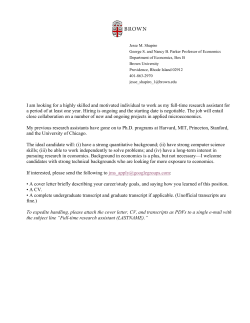
Communication of ESI Funds 2014
Communication of ESI Funds 2014 - 2020 Result-Based Implementation • Monitoring and Evaluation 6th – 7th July 2015, Berlin Brochure European Seminar With focus on: • Strategic perspective for 2014-2020 and lessons learnt • Communication strategies and the result-based approach for communication • Designing result-based communication plans and activities • Monitoring and evaluation of EU Funds communication • Digital strategy and social media • Good practice projects Workshop: Designing an Effective Communication Plan 1 EUROPEAN SEMINAR Communication of ESI Funds 2014 - 2020 Increased Communication Requirements in the Programming Period 2014-2020 For the new Programming Period 2014-2020, the European Commission pays increased attention to communication as well as to results and outcomes in European Investment and Structural Funds (ESI Funds). Managing Authorities or intermediate bodies have to carefully set up communication plans, in order to raise participation and ensure high quality projects as well as to make public investment more visible and transparent. The communication strategies should be viewed as framework documents outlining goals of Operational Programmes, programmes’ communications environments, budgets, evaluation strategies and monitoring tools for the entire programming period. The new requirements emphasise the crucial role of communication for achieving better performing programmes and projects in ESI Funds, in particular where funds are used for changes in awareness and behaviour through communication. In many cases, communication measures are an important tool for mitigating risks and ensuring high Who is this seminar for? This European Seminar is the perfect professional training for all who are in charge of Communication for ESI Funds 2014-2020: • • • • • • European Regional Development Fund (ERDF) European Social Fund (ESF) Cohesion Fund (CF) European Territorial Cooperation (INTERREG V) European Agricultural Fund for Rural Development (EAFRD) European Maritime and Fisheries Fund (EMFF) stakeholder commitment at programme level. From institutions such as: Are you well Prepared for the Requirements on Communicating ESI • • • • • Funds? Member States and Managing Authorities are confronted with far more complex requirements regarding the communication of ESI Funds in the ongoing Programming Period. Those changes concern especially transparency and the access to information as well as increased emphasis on the effectiveness in project communication. But what do those increased requirements mean for your 2014-2020 communication activities? What are important elements of a communication strategy? How to design sound indicators and how to monitor ESI Funds communication results? How to best address potential beneficiaries and the public? Be prepared! Equip yourself optimally for the current Programming Period and find out what the latest regulations mean for your communication activities of ESI Funds as well as their monitoring and evaluation. Acquire detailed knowledge of effective communication at this European Seminar; learn from the presented aggregated experiences and best practices to be well prepared to successfully handle challenges in your future design, monitoring and evaluation of communication. “Extremely useful to see best practice examples.“ Clara Smith, Marketing Manager, North West Regional Development Agency, United Kingdom 2 Managing Authorities Joint Technical Secretariats Intermediate Bodies and other Authorised Bodies National Authorities and Agencies Regional and local administrations As well as for: • Beneficiaries and potential beneficiaries • External Agencies dealing with implementation of communication activities • Consultancies advising EU Funds bodies and beneficiaries on communication What will you learn at this Seminar? • What are the new regulations and obligations for communication in ESI Funds 2014-2020? What are the lessons learnt from 2007-2013? • What are the key elements in effective planning of communication? Your benefits • Become familiar with the new result-oriented requirements for communication strategies for the Programming Period 2014-2020 • How to address different target groups • What does the new result-based approach for communication activities practically mean? What are the pitfalls and how to avoid them? • How to develop an intervention logic and plan • How can you integrate programme-project cooperation in communication in the best way? • How to design annual communication plans that contribute efficiently to the new requirements • How to monitor and evaluate communication plans and activities? What are the relevant indicators of achievement? • How to report and revise communication activities to achieve higher understanding and facilitate decision making • How to develop digital strategies and efficiently use social media Exchange | Discuss | Contribute Your participation is essential! You benefit particularly from this interactive seminar if you contribute your own communication working material such as: • Communication strategies and communication plans branding examples • ESI Funds project flyers, brochures and posters • Website demonstrations and any other useful material demonstrating your communication activities. Please send us your materiel in advance. • Be aware of common pitfalls in the design – Avoid the risk of choosing wrong measures • Be sure to optimally plan your resources • Familiarise yourself for the changes regarding evaluation and monitoring of communication strategies • Improve your performance and results in communicating ESI Funds and ensure a high quality of your evaluation reports • Learn how to apply advanced communication activities and extend you knowledge about the use of digital communication tools – Discover new approaches for your daily tasks and get access to new learning sources • Increase the capacity of your organisation from a multiplicity of good practice examples • Practice first-hand communication cases in interactive exercises • Exchange your knowledge with experts and colleagues from other Member States in interactive workshops • Insights in practices of other countries and exchange with experts from all over Europe Optional Course for the „Master of Management in EU Funds“ This European Seminar is also an Optional Course for the „Master of Management in EU Funds“ For further Information, please click here. 3 PROGRAMME DAY 1 Communication of ESI Funds 2014 - 2020 8.30-9.00 Registration and Handout of Seminar Material 9.00-9.05 Opening Remarks from the European Academy for Taxes, Economics & Law 9.05-9.45 Welcome Note from the Chair and Round of Introductions •Participants expectation and collection of questions Carl Henrik Josephson, Senior Communications Expert and former European Programme Communications Manager, Denmark 9.45-10.45 New Regulations on Communication of ESI Funds 2014-2020 •Strategic perspective for ESI Funds 2014-2020 •Legal framework – Obligations on communicating ESI Funds •New responsibilities for Managing Authorities – Communication strategy, single website, publicising achievements, list of operations, launch events and annual information activities Carl Henrik Josephson, Senior Communications Expert and former European Programme Communications Manager, Denmark Anna Kanakaki, Senior Expert & ESIF Communication Expert, Management & Organisation Unit for Development Programmes, Hellenic Single Public Procurement Authority (HSPPA) and former Senior Programming and Evaluation Expert, ESF Managing Authority, Hellenic Ministry of Health & Welfare, Greece 10.45-11.00 Discussion Round 11.00-11.30 Coffee Break and Networking Opportunity CARL HENRIK JOSEPHSON Senior Communications Expert and former European Programme Communications Manager, Denmark Carl Henrik Josephson is a communications professional and Strategic Communications consultant with more than 15 years working experience in communications, media and marketing in Europe. He is the Founding Director of a strategic communication consultancy for institutions, programmes and projects. Carl Henrik Josephson has been working with European funding since 2006, managing communications for a European programme, including all aspects of communication management and facilitation, internal and external, as well as long term strategic planning and daily tactical implementation. He has extensive experience in drafting, assessing and advising on communication planning and implementation, on programme as well as project level. Commissioning and managing media projects across platforms and different back office functionalities have been part of the work and he has extensive experience in Content management system (CMS) and knowledge management. Previous jobs included Project Manager and copywriting positions in marketing and media, and working in publishing as Editor in Chief and Writer. Carl Henrik Josephson is a regular chair, speaker and trainer at events and seminars. He has extensive experience in designing and managing training courses, events and conferences. 11.30-12.15 Communication Strategies – Lessons Learnt, New Elements and Important Challenges •Lessons learnt from 2007-2013 and challenges of ESI Funds communication 2014-2020 •Key elements in effective planning of communication •Addressing different target groups – EU citizens, potential beneficiaries, multipliers Anna Kanakaki, Senior Expert & ESIF Communication Expert, Management & Organisation Unit for Development Programmes, Hellenic Single Public Procurement Authority (HSPPA) and former Senior Programming and Evaluation Expert, ESF Managing Authority, Hellenic Ministry of Health & Welfare, Greece 12.15-12.30 “A practical approach to communications theory” Discussion Round Ruta Sile, Senior Project Manager, Latvian Railway, Latvia 4 ANNA KANAKAKI 12.30-13.15 Result-Based Approach for Communication in ESI Funds •Making Cohesion Policy more visible, transparent and accessible •Basic principles and tips for results •How to plan and design result-based communication plans and activities Anna Kanakaki, Senior Expert & ESIF Communication Expert, Management & Organisation Unit for Development Programmes, Hellenic Single Public Procurement Authority (HSPPA) and former Senior Programming and Evaluation Expert, ESF Managing Authority, Hellenic Ministry of Health & Welfare, Greece 13.15-13.30 Discussion Round 13.30-14.30 Lunch Break and Networking Opportunity 14.30-15.30 Design & Methods for Communication of ESI Funds •Intervention Logic •How to draft a Logframe for communication •Commissioning communication – Pros and cons of outsourcing, pitfalls and innovative approaches Anna Kanakaki, Senior Expert & ESIF Communication Expert, Management & Organisation Unit for Development Programmes, Hellenic Single Public Procurement Authority (HSPPA) and former Senior Programming and Evaluation Expert, ESF Managing Authority, Hellenic Ministry of Health & Welfare, Greece Senior Expert & ESIF Communication Expert, Management & Organisation Unit for Development Programmes, Hellenic Single Public Procurement Authority (HSPPA) and former Senior Programming and Evaluation Expert, ESF Managing Authority, Hellenic Ministry of Health & Welfare, Greece Anna Kanakaki, a Project Manager (certified by the International Project Management Association, IPMA level D), was Senior Programming and Evaluation Expert in the Managing Authority of the Hellenic Ministry of Health & Welfare. She was Project Manager for ESI Funds, PHARE, TACIS and the OECD and was involved in interventions under pre-accession Funds in Greece, Bulgaria, Cyprus, Romania, Ukraine and Albania. She has large expertise on advanced communication, planning and implementation of policy goals and designing monitoring systems and evaluation schemes. She participated actively in working groups and networks of the European Commission such as the INFORM Network of DG REGIO, DG Employment and national trainers groups. She has also been appointed as regional Coordinator for the Community of Practice on Result Based Management (RBM) supported by DG Employment. Furthermore, she is member of the Association of Project Managers in Greece and acts as Senior Trainer in the Hellenic Academy for Public Administration. In September 2013, Anna Kanakaki became Senior Expert Officer in the Greek Single Public Procurement Authority. 15.30-15.45 Discussion Round “Great lectures. Professionally done seminar.” Michal Klusák, Communication Officer, EU Publicity Department, Ministry of Regional Development, Czech Republic “Well organised seminar and competent speakers” Bratislava Mladenova, Chief Expert, Coordination, Organizational Development & Publicity Unit, Ministry of Economy and Energy, Bulgaria 5 PROGRAMME DAY 1 Communication of ESI Funds 2014 - 2020 Workshop 15.45-17.15 How to Design Effective Communication Plans and Implications of Different Aspects of Communication The planning and design of communication plans are a crucial step in each communication strategy. In this practical session participants will carry out an interactive group work. The group work includes: Effective and relevant planning Design of Communication plans and use of methods Participants then present their results to each other. In case of any questions our expert is ready to give advice. A coffee break will be included in this session. Carl Henrik Josephson, Senior Communications Expert and former European Programme Communications Manager, Denmark 17.15 End of Day One “It is a very relevant and up-to-date seminar which helped me a lot in developing ideas to meet the importance of communication.” Fiona Ismailaj, Monitoring Specialist, Monitoring and Quality Assurance Directorate, Ministry of Finance, Albania “Very useful and fruitful seminar, with an emphasis on good and bad examples.” Pambina Neokleous, Planning Officer, Planning Bureau, Cyprus 6 Summer in Berlin PROGRAMME DAY 2 Communication of ESI Funds 2014 - 2020 Workshop 9.00-9.05 Welcome Note from the Chair 12.00-13.30 9.05-10.15 In this practical session participants will study a real project. They deal with an example (campaign) where they can directly apply their newly obtained knowledge of monitoring and evaluation. The task includes Carl Henrik Josephson, Senior Communications Expert, Denmark Monitoring of Communication Plans and Activities in ESI Funds •Basic definitions and key challenges 2014-2020 •Monitoring communication – Step by step approach •Designing indicators and measurement of achievements Anna Kanakaki, Senior Expert & ESIF Communication Expert, Management & Organisation Unit for Development Programmes, Hellenic Single Public Procurement Authority (HSPPA) and former Senior Programming and Evaluation Expert, ESF Managing Authority, Hellenic Ministry of Health & Welfare, Greece 10.15-10.30 Discussion Round 10.30-11.00 Coffee Break and Networking Opportunity Monitoring and Evaluation – Practical Exercise Assessments of findings Supporting of decision-making Participants work in small groups. The groups then present their results to each other. In case of any questions our expert is ready to give advice. Anna Kanakaki, Senior Expert & ESIF Communication Expert, Management & Organisation Unit for Development Programmes, Hellenic Single Public Procurement Authority (HSPPA) and former Senior Programming and Evaluation Expert, ESF Managing Authority, Hellenic Ministry of Health & Welfare, Greece 11.00-11.45 Evaluation Strategies, Reporting and Revision of Communication Plans •Evaluation strategies •Reporting results •Revision of communication plans 13.30-14.30 Lunch Break and Networking Opportunity 14.30-15.15 Carl Henrik Josephson, Senior Communications Expert and former European Programme Communications Manager, Denmark Digital Strategy and Social Media 11.45-12.00 Carl Henrik Josephson, Senior Communications Expert and former European Programme Communications Manager, Denmark Discussion Round •Digital strategies – New ways to promote EU Funds programmes and projects •Social media in the public realm •Effective social media implementation with limited resources 15.15-15.30 Discussion Round 15.30-16.30 Conclusion and Interactive Discussion With Participants •Good practise criteria & case studies •Knowledge-check •Seminar debrief Carl Henrik Josephson, Senior Communications Expert and former European Programme Communications Manager, Denmark 16.30 End of Seminar and Handout of Certificates 7 ORGANISATIONAL MATTERS Communication of ESI Funds 2014 - 2020 BOOKING Date of Event 6th - 7th July 2015 Booking Number S-1045 MC Event Language The event language will be English. Event Price Early booking contingent until the 17th of April 2015: 989,- Euro, excl. German VAT (19%) Normal price from the 18th of April 2015: Fax: +49 (0)30 802080-250 E-mail: booking@euroacad.eu Phone: +49 (0)30 802080-230 For online booking please visit our website: www.euroacad.eu Contact European Academy for Taxes, Economics & Law at Potsdamer Platz, Entrance Leipziger Platz 9, 10117 Berlin, Germany Phone: +49 (0)30 80 20 80 230 Fax: +49 (0)30 80 20 80 250 E-mail: info@euroacad.eu Internet: www.euroacad.eu 1.289,- Euro, excl. German VAT (19%) The above price covers the following: • Admission to the seminar • Hand-out documents in print and digital version • Seminar certificate, if seminar fully attended • Soft drinks and coffee/tea on both event days • Lunch on both event days Booking Modalities It is recommended to book soon as seats are limited. For organisational matters, we kindly ask you to complete the booking form in capital letters. Your contact persons for the programme: Regina Lüning, M. Sc. econ. Head of Marketing and Sales Phone: +49 (0)30 80 20 80 246 Fax: +49 (0)30 80 20 80 259 E-mail: regina.luening@euroacad.eu Michel Achenbach M.A. Conference Manager Phone: +49 (0)30 80 20 80 211 Fax: +49 (0)30 80 20 80 259 E-mail: michel.achenbach@euroacad.eu (Programme is subject to alterations) Event Location Arcotel John F Werderscher Markt 11 10117 Berlin Phone: +49 (0)30 2888 6578 95 E-mail: reservation.johnf@arcotel.at Please contact the hotel directly and refer to the “European Academy for Taxes, Economics & Law” if you wish to benefit from a limited room availability-contingent. Of course you can always look for an alternative hotel accommodation. 8 BOOKING Fax: +49 (0)30 802080-250 E-mail: booking@euroacad.eu Phone: +49 (0)30 802080-230 For online booking please visit our website: www.euroacad.eu European Academy for Taxes, Economics & Law Phone.: +49 (0)30 802080-230 at Potsdamer Platz Fax: Entrance: Leipziger Platz 9 E-mail: info@euroacad.eu 10117 Berlin / Germany www.euroacad.eu BOOKING BOOKING NUMBER: S-1045 MC (DMW) +49 (0)30 802080-250 6 th – 7 th JULY 2015, BERLIN Herewith we register the following persons for the Seminar: “Communication of ESI Funds 2014-2020“. Delegate 1 Ms. Mr. First name Last name Department Job position Phone Fax E-mail Your organisation Street Postcode / City Country Delegate 2 Ms. Mr. First name Last name Department Job position Phone Fax E-mail Your organisation Street Postcode / City Country Delegate 3 Ms. Mr. First name Last name Department Fax Job position Phone E-mail Your organisation Street Postcode / City Country Invoice organisation To the attention of Street Phone Postcode / City Fax Country E-mail In case of registration of more than one delegate - do you prefer: single invoice? collective invoice? With my signature I confirm my registration and accept the General Terms and Conditions as legally binding. NOTE Only Valid with Signature and Stamp. I herewith agree to receive further information from the European Academy for Taxes, Economics & Law Place, Date Authorised Signature and Stamp 9 European Academy for Taxes, Economics & Law Brauner Klingenberg GmbH | Leipziger Platz 9 | 10117 Berlin | Phone +49 (0)30 80 20 80 230 | Fax +49 (0)30 80 20 80 259 Terms & Conditions for Conferences, Seminars and other Training Courses 1. Area of Application The following terms and conditions settle the contractual relationship between conference participants and the European Academy for Taxes, Economics & Law Brauner Klingenberg GmbH [referred to as “European Academy for Taxes, Economics & Law” in the following]. Differing terms and conditions, as well as, other settlements and/or regulations have no validity. 2. Registration / Confirmation of Application A registration can be made via internet, mail, fax, or email. The registration is considered granted and legally binding if not rejected by the European Academy for Taxes, Economics & Law in writing within seven (7) days after receipt of registration. The registration will be supplemented by a booking confirmation via email. Partial bookings are only valid for seminars designed in modules. 3. Service The course fee covers the fee per participant and course in € net, subject to current German VAT. It includes training course documents as per course description, a lunch meal/ snack and refreshments during breaks, as well as, a participation certificate. The European Academy for Taxes, Economics & Law has the right to change speakers/instructors and to modify the course program if and where necessary while maintaining the overall nature of the course. All registered participants will be notified in case of a course cancellation due to force majeure, due to speakers’ preventions, due to troubles at the chosen location or due to a low registration rate. Course cancellation notification due to a low registration rate is issued no later than two (2) weeks before the course date. Course fees are reimbursed in the cases listed above; however, reimbursement for travel expenses or work absenteeism is only granted in cases of intention or gross negligence by the European Academy for Taxes, Economics & Law. Any reimbursement of travel expenses are to be considered as an exceptional goodwill gesture and form no future general obligation. In case of disturbances and/or interruptions, the European Academy for Taxes, Economics & Law commits itself to solve or limit any problems that might occur in order to maintain and continue the course as planned. 4. Payment Date and Payment, Default of Payment Payment of the course fee is payable immediately upon receipt of invoice. Where payment is not received or lacking clear assignment to a participant prior to commencement of the course, the European Academy for Taxes, Economics & Law may refuse the relevant participant’s participation in that course. The course fee, however, is still due immediately and can be claimed as part of a dunning procedure or legal action. In accordance with BGB §247 (1), in case of default of payment within the stipulated time period, default interest on arrears of at least 5% above the ECB base rate is due and payable. The European Academy for Taxes, Economics & Law can claim higher damage for delay if and where proven. Equally, the participant may prove that a damage has not occurred or has had less effect than estimated by the European Academy for Taxes, Economics & Law. Payment shall be made by cashless bank transfer; cash or cheques will not be accepted. The European Academy for Taxes, Economics & Law is not liable for any loss of means of payment. The participant may only offset such claims against the European Academy for Taxes, Economics & Law’s as are undisputed, legally recognized or recognized in writing by the European Academy for Taxes, Economics & Law. The right of retention is only acceptable in accordance with a counterclaim based on the same contract. 5. Cancellation Cancellations need to be issued in writing. Cancellation by the participant will be subject to cancellation charges as follows: • 30 days or more prior to commencement of the course: service charge of 80,00 € net, subject to current German VAT, payable immediately, course fee will be reimbursed, • two (2) weeks to 30 days prior to commencement of the course: 50% of course fee net, subject to current German VAT, payable immediately, • non-attendance or cancellation less than two (2) weeks prior to commencement of the course: 100% of course fee net, subject to current Germany VAT, payable immediately The European Academy for Taxes, Economics & Law gladly accepts without additional costs a substitute participant nominated in case of a cancellation if the substitute participant is registered at least three (3) days prior to the commencement of the course. Neither cancellation of a specific module/part of the course or substitution per module/per day is possible. 6. Copyright Seminar/course documents are protected by property rights and may not be duplicated, processed, amended, circulated or published in any other way without the written consent of the European Academy for Taxes, Economics & Law. The European Academy for Taxes, Economics & Law reserves all rights. 7. Liability All seminars and courses are prepared and presented by qualified speakers and instructors. The European Academy for Taxes, Economics & Law accepts no liability for the upto-dateness, correctness and completeness of the seminar documentation, as well as, presentation of the seminar. 8. Applicable Law, Place of Jurisdiction, Place of Performance All cases shall be governed and construed in accordance with German law to the exclusion of the UN Sales Convention. As far as legally admissible, place of performance and place of exclusive jurisdiction shall be Berlin, Germany. 9. Data Protection The European Academy for Taxes, Economics & Law protects personal data by taking appropriate protection measures. For the purpose of optimization of the product and service portfolio and according to the regulations of the data privacy laws, it stores and processes person-specific data on the training participants. Hence, all European Academy for Taxes, Economics & Law website hits are registered. All personal data will, in accordance with the law, be used for documentation requests, placed orders or other enquiries in order to send information out by post. The European Academy for Taxes, Economics & Law will, in accordance with the law, inform participants by email about special offers that resemble previously booked seminars. If and where personal data needs to be transferred to countries lacking appropriate data protection schemes, the European Academy for Taxes, Economics & Law shall grant alternative adequate protection. Furthermore, the European Academy for Taxes, Economics & Law will use personal data as far as participants have granted respective permission. When collecting personal data, the European Academy for Taxes, Economics & Law will always ask for permission regarding email information about offers. The participant may, at any time, express their objection to data collection for the purpose of advertisement or address via email or fax. Any data provided to the European Academy for Taxes, Economics & Law will be processed for reservations and bookings, as well as, for information about other seminars. Names and company names will be published in a participants’ list and forwarded to the mailing company. 10
© Copyright 2025










